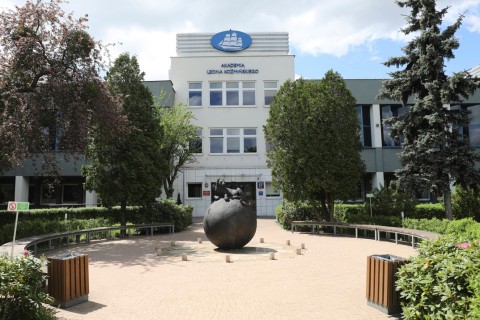Home » Why Poland?
Why Poland is one of the leaders
among EU countries for education in Europe
More Info
The best fees
for tuition
We have prepared a breakdown of tuition fees for the Financial Specialist for one year of study:
Poland
2 400 EUR
The Czech Republic
6 000 EUR
Germany
18 974 EUR
England
22 353 EUR

Poland
2 400 EUR
The Czech Republic
6 000 EUR
Germany
18 974 EUR
England
22 353 EUR
Poland
2 400 EUR
The Czech Republic
6 000 EUR
Germany
18 974 EUR
England
22 353 EUR

3 year
program
Bachelor’s (BA) – a degree awarded after 3 to 4 years of study at a university.

Exchange programs in Europe
Studying in Europe offers students numerous opportunities for international exchange, internships and provides valuable experience. One of the most popular programs is Erasmus+, which allows students to study at partner EU universities from one semester to a year. This is a fantastic chance to both improve language skills and explore the culture of another country and broaden professional horizons.
In addition to the Erasmus+ program, many European universities offer bilateral exchange agreements that provide students with the chance to attend lectures, apply for scholarships, and take part in internships abroad. The most popular exchange destinations include Germany, France, Spain, Italy, and the Scandinavian countries where students can gain unique international experience.
Life in Poland
Student life
Educational Process
Accommodation
Applicants have the option to live in either dormitories or rented apartments.
Dormitory rooms are equipped with all students’ amenities, including the internet access and washing machines. Rooms typically accommodate 2-4 people. The average cost of staying in a dormitory ranges from 240 – 960 euro (1000 to 4000 PLN) per month, depending on the conditions.
Students can also rent an apartment. In this case, the rent is paid separately from utility bills. The cost of living depends on the number of rooms, the apartment’s distance from the city center, and from educational institutions. The apartment rent starts from 720 euro (3000 PLN) per month, depending on the conditions.
Food
Students in Poland can either cook for themselves or eat at cafes and cafeterias. Universities have their own cafeterias for students and staff, where a meal costs from 6 euro (25 PLN). Additionally, there are many shopping centers (Lidl, Biedronka, Tesco, Auchan) in the cities where food can be bought at affordable prices. Overall, students’ monthly food expenses range from 190 – 360 euro (800 to 1500 PLN).
Transport
Poland’s public transportation system is highly developed. In Warsaw, for example, there is the underground, city trains, buses and trams. All transportation operates on a fixed schedule, with timetables for different means of transport at each stop showing the exact times.
Public transport tickets can be purchased at kiosks or designated ticket-selling points. The tickets must be “validated” at a ticket machine inside the vehicle, or a fine will be imposed. All tickets are valid for any means of transport. However, there are different ticket options depending on the length of the ride or the period of the pass (daily, weekly, etc.).
Students can purchase a monthly pass for unlimited travel on all city transport (tram, bus,underground, and city trains) at a discounted student rate. The cost of the monthly pass ranges from 13 -35 euro (55 to 140 PLN), depending on the type of pass.
Educational Process
The institution may have a specialized focus, such as technical, economic, natural sciences, or medical fields.
Graduates of Polish universities have the opportunity to earn the following degrees:
Bachelor’s Degree (BA) – a degree awarded after 3 to 3.5 years of study at a university.
Bachelor’s Degree (BSc, Engineer) – a degree awarded after 3.5 to 4 years of study at a higher technical educational institution in technical, agricultural, or economic fields.
Master’s Degree (MA, Magister), as well as titles equivalent to this degree (Master of Education, Master of Arts, Master of Engineering, Master of Engineering-Architect, Doctor of Dentistry, or Doctor of Veterinary Medicine), are awarded after the successful completion of
5 years of standard education. In medical and veterinary sciences, the program lasts 6 years.
Master’s Degree (MSc) – a master’s degree in the relevant field can also be obtained after completing a 2 year master’s course for professional development. This degree can be earned after completing higher education institutions with the title of Licencjat or Engineer.
Doctor of Science (PhD, Doctor) – awarded to those who pass the PhD qualifying exams and successfully defend their dissertation. To begin doctoral studies, one must hold a Master’s degree or an equivalent title.
Academic Year
Education in Poland is available in both full-time and part-time formats. Full-time studies are held from Monday to Friday, typically from 8:00 AM to 8:00 PM. During the week, students have a free day for self-study, which includes visiting libraries, reading rooms, and working online.
Part-time students attend classes twice a month at the weekends, Saturday and Sunday.
The academic year lasts 10 months, divided into two semesters: winter and spring.
The first holiday break i s for Christmas and typically is from December 20 to January 2.
Most students take advantage of the nearly 4 months of summer vacation to travel abroad (to countries like the USA, UK, Netherlands, Spain, Italy, Canada, Portugal, etc.) for various student exchange programs, internships or training opportunities.
To successfully complete the semester, a student must achieve passing grades on all exams. The most common grading system is as follows:
- Excellent (5)
- Good with a plus (4.5)
- Good (4)
- Satisfactory with a plus (3.5)
- Satisfactory (3)
- Unsatisfactory (2)
A student who, for valid reasons, could not pass the exam (or received a failing grade of “2”) has the right to retake the exam during the next exam session. Typically, a student is allowed up to two retakes of an exam.
If the student fails to pass the session, there may be a possibility of expulsion from the university. However, in certain circumstances, an expelled student may have the right to re-enroll.
Bologna System. Recognition of Diplomas
Together with 46 other European countries, Poland signed the Bologna Declaration, aimed at creating a European Higher Education Area. Polish higher education institutions use the ECTS (European Credit Transfer and Accumulation System). This system was implemented to facilitate the comparison of students’ educational levels across different academic fields.
Polish universities participate in international student exchange programs such as SOCRATES / Erasmus. Diplomas from Polish educational institutions are recognized throughout Europe and in most countries worldwide, meaning no additional validation is required. Additionally, the diploma supplement, issued upon graduation, helps facilitate the recognition of education in other countries.
Quality Guarantee:
The Polish State Accreditation Committee (Państwowa Komisja Akredytacyjna) has been operating in Poland since 2002. It is responsible for monitoring and ensuring the quality of educational standards in Polish higher education institutions. The committee works to improve educational standards and provide guarantees regarding the quality of education.
The State Accreditation Committee collaborates closely with accreditation bodies in other countries. The Polish higher education quality assurance system complies with the standards and requirements of ENQA (European Association for Quality Assurance in Higher Education).
Tuition Fees in Poland:
The cost of studying at private universities ranges from €2400 per year for a bachelor’s or master’s degree.
For a doctoral degree or postgraduate studies, the tuition fees range from €3000 per year.
In addition to tuition fees, applicants must pay a one-time registration fee upon admission. This fee is typically up to €350, although in most universities it ranges from €100-200. The registration fee covers the university’s administrative expenses, such as issuing a student ID, a record book, and other related costs.
Student life
Accommodation
Applicants have the option to live in either dormitories or rented apartments.
Dormitory rooms are equipped with all students’ amenities, including the internet access and washing machines. Rooms typically accommodate 2-4 people. The average cost of staying in a dormitory ranges from 240 – 960 euro (1000 to 4000 PLN) per month, depending on the conditions.
Students can also rent an apartment. In this case, the rent is paid separately from utility bills. The cost of living depends on the number of rooms, the apartment’s distance from the city center, and from educational institutions. The apartment rent starts from 720 euro (3000 PLN) per month, depending on the conditions.
Food
Students in Poland can either cook for themselves or eat at cafes and cafeterias. Universities have their own cafeterias for students and staff, where a meal costs from 6 euro (25 PLN). Additionally, there are many shopping centers (Lidl, Biedronka, Tesco, Auchan) in the cities where food can be bought at affordable prices. Overall, students’ monthly food expenses range from 190 – 360 euro (800 to 1500 PLN).
Transport
Poland’s public transportation system is highly developed. In Warsaw, for example, there is the underground, city trains, buses and trams. All transportation operates on a fixed schedule, with timetables for different means of transport at each stop showing the exact times.
Public transport tickets can be purchased at kiosks or designated ticket-selling points. The tickets must be “validated” at a ticket machine inside the vehicle, or a fine will be imposed. All tickets are valid for any means of transport. However, there are different ticket options depending on the length of the ride or the period of the pass (daily, weekly, etc.).
Students can purchase a monthly pass for unlimited travel on all city transport (tram, bus,underground, and city trains) at a discounted student rate. The cost of the monthly pass ranges from 13 -35 euro (55 to 140 PLN), depending on the type of pass.
Educational Process
Educational Process
The institution may have a specialized focus, such as technical, economic, natural sciences, or medical fields.
Graduates of Polish universities have the opportunity to earn the following degrees:
Bachelor’s Degree (BA) – a degree awarded after 3 to 3.5 years of study at a university.
Bachelor’s Degree (BSc, Engineer) – a degree awarded after 3.5 to 4 years of study at a higher technical educational institution in technical, agricultural, or economic fields.
Master’s Degree (MA, Magister), as well as titles equivalent to this degree (Master of Education, Master of Arts, Master of Engineering, Master of Engineering-Architect, Doctor of Dentistry, or Doctor of Veterinary Medicine), are awarded after the successful completion of
5 years of standard education. In medical and veterinary sciences, the program lasts 6 years.
Master’s Degree (MSc) – a master’s degree in the relevant field can also be obtained after completing a 2 year master’s course for professional development. This degree can be earned after completing higher education institutions with the title of Licencjat or Engineer.
Doctor of Science (PhD, Doctor) – awarded to those who pass the PhD qualifying exams and successfully defend their dissertation. To begin doctoral studies, one must hold a Master’s degree or an equivalent title.
Academic Year
Education in Poland is available in both full-time and part-time formats. Full-time studies are held from Monday to Friday, typically from 8:00 AM to 8:00 PM. During the week, students have a free day for self-study, which includes visiting libraries, reading rooms, and working online.
Part-time students attend classes twice a month at the weekends, Saturday and Sunday.
The academic year lasts 10 months, divided into two semesters: winter and spring.
The first holiday break i s for Christmas and typically is from December 20 to January 2.
Most students take advantage of the nearly 4 months of summer vacation to travel abroad (to countries like the USA, UK, Netherlands, Spain, Italy, Canada, Portugal, etc.) for various student exchange programs, internships or training opportunities.
To successfully complete the semester, a student must achieve passing grades on all exams. The most common grading system is as follows:
- Excellent (5)
- Good with a plus (4.5)
- Good (4)
- Satisfactory with a plus (3.5)
- Satisfactory (3)
- Unsatisfactory (2)
A student who, for valid reasons, could not pass the exam (or received a failing grade of “2”) has the right to retake the exam during the next exam session. Typically, a student is allowed up to two retakes of an exam.
If the student fails to pass the session, there may be a possibility of expulsion from the university. However, in certain circumstances, an expelled student may have the right to re-enroll.
Bologna System. Recognition of Diplomas
Together with 46 other European countries, Poland signed the Bologna Declaration, aimed at creating a European Higher Education Area. Polish higher education institutions use the ECTS (European Credit Transfer and Accumulation System). This system was implemented to facilitate the comparison of students’ educational levels across different academic fields.
Polish universities participate in international student exchange programs such as SOCRATES / Erasmus. Diplomas from Polish educational institutions are recognized throughout Europe and in most countries worldwide, meaning no additional validation is required. Additionally, the diploma supplement, issued upon graduation, helps facilitate the recognition of education in other countries.
Quality Guarantee:
The Polish State Accreditation Committee (Państwowa Komisja Akredytacyjna) has been operating in Poland since 2002. It is responsible for monitoring and ensuring the quality of educational standards in Polish higher education institutions. The committee works to improve educational standards and provide guarantees regarding the quality of education.
The State Accreditation Committee collaborates closely with accreditation bodies in other countries. The Polish higher education quality assurance system complies with the standards and requirements of ENQA (European Association for Quality Assurance in Higher Education).
Tuition Fees in Poland:
The cost of studying at private universities ranges from €2400 per year for a bachelor’s or master’s degree.
For a doctoral degree or postgraduate studies, the tuition fees range from €3000 per year.
In addition to tuition fees, applicants must pay a one-time registration fee upon admission. This fee is typically up to €350, although in most universities it ranges from €100-200. The registration fee covers the university’s administrative expenses, such as issuing a student ID, a record book, and other related costs.
Dormitory photos











Apply now
We will select the field of study, educational institution, and explain the admission process in detail for you. Free consultation.
We respond as quickly as possible!







